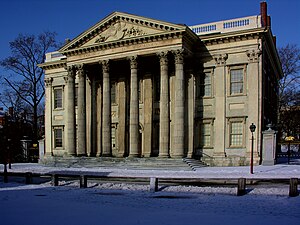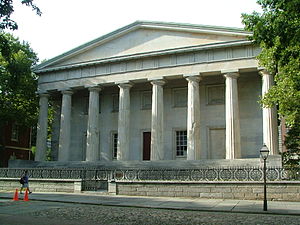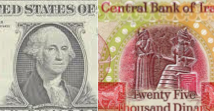 English: First Bank of the United States (Photo credit: Wikipedia)
English: First Bank of the United States (Photo credit: Wikipedia)
English: First Bank of the United States (Photo credit:
Wikipedia)
The 1830`s were a tumultuous decade for
America. The attempt by the
Second Bank of the United States for an early re-charter was passed by Congress in July 1832, but the bill was vetoed shortly thereafter by
President Andrew Jackson. The hopes of the bank's supporters to turn the veto in a winning campaign issue in that fall's presidential campaign failed dismally. In 1833, Jackson retaliated against the bank by removing federal government deposits and placing them in "pet"
state banks. As federal revenue from land sales soared, Jackson saw the opportunity to fulfil his dream of paying off the national debt - which he did in early 1835. But as the economy overheated and so did state dreams of infrastructure projects. Congress passed a law in 1836 that required the federal surplus to be distributed to the states in four payments. Shortly afterwards, the Jackson Administration declared in its "
Specie Circular" that payments for federal land purchases be made in specie. When combined with loose state banking practices and a credit contraction, a major economic crisis was brewing when Martin Van Buren took office as president in March 1837. Two months later, New York City banks suspended specie payments. A major economic recession was soon under-way. Van Buren - under pressure from his mentor Jackson - decided not to suspend the Specie Circular. Instead, he proposed a set of economic proposals that September - the most of important of which - an independent Sub-Treasury - Congress refused to pass. As a result, the recession double dipped in 1839 and the national economy did not recover until 1843.
The Second Bank of the United States
 English: Second Bank of the United States, Philadelphia, built 1819-24, William Strickland, architect. (Photo credit: Wikipedia)
English: Second Bank of the United States, Philadelphia, built 1819-24, William Strickland, architect. (Photo credit: Wikipedia)
English: Second Bank of the United States, Philadelphia, built 1819-24, William Strickland, architect. (Photo credit: Wikipedia)
The first Bank of the United States died when its twenty-year charter expired in 1811. Re-charter of BUS was strongly backed by Treasury Secretary Albert Gallatin, weakly backed by President James Madison, opposed by
Vice President George Clinton, opposed by the House of Representatives, and strongly opposed by former President Thomas Jefferson. House Speaker
Henry Clay's later support of a national bank in the 1820s and 1830s linked him to the American originator of the bank idea,
Alexander Hamilton, but Clay had begun his political life as an opponent of the national bank. Only later, Clay and other Jeffersonians came to recognize the important functions played by the BUS. Historian Sean Wilentz wrote: "Republican reconciliation with Hamilton's bank idea had taken place by fits and starts, and was never monolithic. In 1811,...the
Madison administration, goaded by Secretary of the Treasury Gallatin, supported it....In Congress, a coalition of Republican southerners and westerners, seeing the bank as an instrument for economic development in their respective regions led the re-charter effort."
1 However, the effort fell short in the House. Historian Gordon S. Wood noted that "the more important enemies of the BUS were the state banks. By regularly redeeming the outstanding notes of the state banks, the BUS had checked their ability to issue notes too far in excess of what they could cover with specie, that is, their reserves, and this had become a deep source of anger....When the twenty-year charter of Hamilton's BUS was about to expire in 1811, it was not surprising that these state banks were determined that it would not be renewed."
2" Henry Clay, Wilentz wrote, thought "the national bank unfairly constrained the operations of state banks."
The death of the first Bank of the United States was almost prevented. "On January 24th, 1811, the House, by a single vote, rejected a preliminary motion on the bank charter, and the fight moved to the Senate," noted Historian John Steele Gordon. "There, on February 20th, the Senate tied 17-17 on another preliminary matter, and Vice President George Clinton, in perhaps the only significant independent act by a vice president in American history, voted against the bank. The Bank of the United States was dead." It was an economically and politically short-sighted act. Gordon noted that "many of the men who voted to kill the bank were the very same men who advocated war - the most expensive of all public policies - with one of the strongest military powers on earth. Given the bank was the government's principal mechanism for collecting internal revenue and its only one for raising loans, the defeat of the charter was perhaps the most feckless act in the history of the
United States Congress, although, to be sure, that is a title for which there has been no little competition over the years."
The
War of 1812 would soon prove the clear need for a government bank to help fund growing government expenses not covered by the nation's limited tariff revenue. Such revenue was further limited by a transatlantic war. The conflict of national economic policy, begun in the 1790s between followers of Alexander Hamilton and Thomas Jefferson, continued. Leading up to the 1812 war, noted financial historian Susan Hoffman, one "group of agrarian, `unreformed' or `unreconstructed' Jeffersonian's, opposed re-charter of the Bank of the United States because they continued to oppose all banking on philosophical grounds. They resurrected the old arguments against the bank's constitutionality. Joining them in opposition to re-charter was the third contingent of congressional Republicans, the free enterprise's. Here was the voice of the `interests' of the day. Led by Henry Clay, they opposed the Bank of the United States because its regulatory hand got in the way of state banks and because its dominance of U.S. government deposits kept those deposits out-of-state bank vaults."
 Jackson slays the many-headed monster of the Second Bank of the United States (1836) (Photo credit: Wikipedia)
Jackson slays the many-headed monster of the Second Bank of the United States (1836) (Photo credit: Wikipedia)
Jackson slays the many-headed monster of the Second Bank of the United States (1836) (Photo credit: Wikipedia)
The War of 1812 upended the long political split in the country about the bank. Now in power for 16 years, many Jeffersonian's began to see the necessity of the bank that Federalists had long championed. Preparations were made for a successor institution. With support of Speaker Clay, President Madison, future President James Monroe, and future Vice President John Calhoun, the Second Bank of the United States was chartered in 1816 for 20 years. By 1816, noted financial historian Susan Hoffman, "Reformed Jeffersonians...had concluded that banking was with us and must be regulated to make sure its consistency with the Jeffersonian concept of the public interest, which emphasized protection of the freedom and equality of people. The key factional shift that allowed the second national bank's charter to pass was on the part of the state banking supporters. Whether they had opposed the central bank because they did not like any regulator or because they thought state regulation would be sufficient, this group concluded, in light of the economic chaos in the absence of the first national bank, that federal regulation was consistent with state banking."6" Historian Sean Wilentz observed that the new bank was designed to curb inflation and speculative frenzies: "Acting as a financial balance-wheel, the national bank would, in principle, keep currency values and capital markets stable, and prevent national economic expansion from turning into an orgy of over speculation and runaway inflation.
The Second Bank of the United States got off to a rocky start. Susan Hoffmann wrote that it "opened for business in January 1817 under William Jones (1816-19) in the midst of the economic boom that followed the end of the War of 1812." 8 Indeed, the revived national bank was not fortunate in its choice of directors who first inflated the currency and then contracted it. Historian Harlow Giles Unger wrote: "Inflated by speculation in western lands, an economic `bubble' suddenly popped, with hundreds of banks shutting down, and thousands of depositors and investors wiped. The land rush had seen the number of banks grow to more than 1,000, with each issuing its own colourful bank notes - normally in two and five-dollar denominations, backed by no one knew what." 9 This period has been dubbed the "Era of Good Feelings," but it was not the era of good economic leadership or economic prosperity. Economic historian Charles Sellers wrote that the "brutal deflation saved the national Bank by sacrificing not only its debtors but the state banks and their hordes of debtors as well, which is to say, most of the market economy. Suddenly in the spring of 1819, as the Bank's pressure was intensified by a similar financial crisis in Britain, world commodity prices collapsed." Sellers wrote that "the collapse of agricultural prices made it impossible for state banks to collect from borrowers or meet obligations to the national Bank. When most state banks suspended the pretence of specie redemption, a flood of business failures and personal liquidation plunged Americans into their first experience of general and devastating economic prostration."
Experience should teach us wisdom. Most of the difficulties our Government now encounters and most of the dangers which impeded over our Union have sprung from an abandonment of the legitimate objects of Government by our national legislation, and the adoption of such principles as are embodied in this act. Many of our rich men have not been content with equal protection and equal benefits, but have besought us to make them richer by act of Congress. By attempting to gratify their desires we have in the results of our legislation arrayed section against section, interest against interest, and man against man, in a fearful commotion which threatens to shake the foundations of our Union. It is time to pause in our career to review our principles, and if possible revive that devoted patriotism and spirit of compromise which distinguished the sages of the Revolution and the fathers of our Union. If we can not at once, in justice to interests vested under improvident legislation, make our Government what it ought to be, we can at least take a stand against all new grants of monopolies and exclusive privileges, against any prostitution of our Government to the advancement of the few at the cost of the many, and in favour of compromise and gradual reform in our code of laws and system of political economy.
 English: issued by the in the amount of $1,000. (Photo credit: Wikipedia)
English: issued by the in the amount of $1,000. (Photo credit: Wikipedia)
English: issued by the in the amount of $1,000. (Photo credit: Wikipedia)
The national government lacked even the most rudimentary financial tools in the secession winter of 1860-61. It lacked both a stable currency and supply of credit along with revenue and banking systems. By the time the sixteenth president, Abraham Lincoln, took the oath of office on March 4, 1861, the country was not only on the verge of Civil War but also a financial disaster. The nation's coffers were empty, left in disarray from three decades of Jacksonian fiscal policies, and the government faced a continuing liquidity crisis in light of the demands generated by Civil War expenditures.
Early in his administration, Lincoln recognized that the war's outcome would be largely determined by resources. Thus, he understood the imperative of raising funds to carry out the war effort. It was against this backdrop that Lincoln appointed Salmon P. Chase to the Treasury, authorizing Chase alone to act on all matters of the country's finances. Chase, like most everyone else when, underestimated the severity of the War—both its duration and its cost. Just as dangerous, perhaps, Chase overestimated the usefulness of Jackson era financial policies to deal with the crisis.
Upon taking office, Chase "found on hand less than $2,000,000, all of which was appropriated ten times over. He calculated that he needed $320,000,000, as he reported to the Congress that met in July 1861," wrote financial historian Bray Hammond. Chase needed credit, revenue, and an increase in the supply of money.
After the fall of Fort Sumter, Lincoln unilaterally began to finance the war effort. Over the month`s that followed, Chase—with Lincoln's occasional assistance—would court Congress, encouraging bond sales, higher tariffs, a single national currency, and bank reforms.
Chase biographer Albert Bushnell Hart wrote: "The most important financial measures during the first year were arrangements for new loans, and the real borrowing of money—both matter`s in which the brief legislation of Congress was very significant, for there was laid the foundation for large issues of bonds, of interest-bearing notes, and of circulating notes."
Chase had asked Congress, meeting in special session during in July 1861, to authorize $240 million in loan`s. Chase was convinced that the government should not sell its securities below par, but there was no market for government securities at par. American financier Jay Cooke became a close advisor to Chase in 1861, suggesting that the Treasury sell bonds directly to the American public, appealing to their patriotism and emotion. Chase, therefore, asked Congress for low-denomination Treasury notes which people could pay for in instalments. As described by historian Phillip S. Paludan, the Treasury secretary sought "to encourage their enthusiasm Chase wanted to have these notes earn interest at a penny a day on a $50 note—a higher rate than usually paid by the government. Average Northern citizens would thus link their fortunes to the success of Union arms."
Future Intentions: According to
Ambrose Evans-Pritchard who has covered world politics and economics for 30 years, based in Europe, the US, and Latin America. Who joined the Telegraph in 1991, serving as Washington correspondent and later Europe correspondent in Brussels. Who is now International Business Editor in London.
The world is moving step by step towards a
de facto Gold Standard, without any meetings of G20 leaders to announce the idea or bless the project.
Some readers will already have seen the GFMS Gold Survey for 2012 which reported that central banks around the world bought more bullion last year in terms of tonnage than at any time in almost half a century.
They added a net 536 tonnes in 2012 as they diversified fresh reserves away from the four fiat suspects: dollar, euro, sterling, and yen.
The Washington Accord, where Britain, Spain, Holland, Switzerland, and others sold a chunk of their gold each year, already seems another era – the Gordon Brown era, you might call it.
That was the illusionary period when investors thought the Euro would take its place as the twin pillar of a new G2 condominium alongside the dollar. That hope has faded. Central bank holdings of Euro bonds have fallen back to 26pc, where they were almost a decade ago. Please download the PDF below of the draft.
Related articles





























